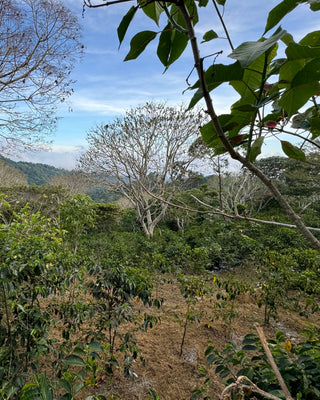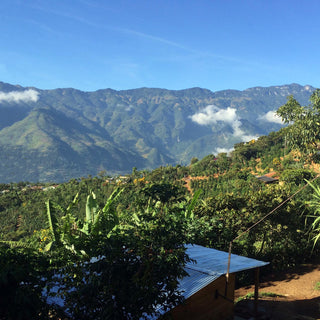- Filter
Aliss Hartmann Geisha Natural
LYCHEE | JASMINE | OOLONG TEA
This omniroast has been optimized for filter, but a well trained barista will definitely be able to pull tasty shots with it.
Adding product to your cart

CONSISTENTLY IMPRESSIVE!
Aliss’ Geisha is beautiful. There’s real beauty in this coffee - it’s elegant, delicate, yet expressive, sweet and tropical. I have been tasting Aliss’ Geisha since 2019 and it always takes my breath away - it’s such an honest representation of the Panama Geisha variety. I think it’s probably a combination of the conditions in the farm (genetics of the variety, climate, soil and shade) and the preciseness of the dehydration of this natural that makes this coffee so good and such a pleasure to drink.
Geisha took the world by storm in 2004, and has taken off since then. After fetching record prices at the Best of Panama auction, Geisha became widely planted throughout Central America. Geisha’s fame, in comparison to other popular coffees, is legitimate. Although Jamaica Blue Mountain, Kona and Kopi Luwak have all become exotic, high-priced coffees, it is not because they are good - it’s just clever marketing. As a variety, Geisha needs little marketing; the cup speaks for itself. This is not to say that all Geishas are automatically amazing, but in the hands of a great producer with the right conditions, Geishas are expressive and explosive and easily recognizable.
The Hartmanns first planted their Geisha trees in 2004 at their Ojo de Agua farm, which is located on the upper slopes in Santa Clara, Panama. Ojo de Agua, named for the various water springs that are born within the farm, ranges in altitude from 1450m to 1550m. The conditions are beautiful for growing coffee. The soil drains slowly, the topsoil is covered by friendly foliage from the surrounding trees, the coffee trees are properly spaced out to provide ample nutrients and create sustainable demands on the soil. The coffee plots are spaced out between various protected forest areas that the Hartmanns cherish and protect.
In the past decade, the five Hartmann siblings have each launched individual projects, in addition to the work they do as a collective at Finca Hartmann. Ratibor and Allan have Finca Guarumo; Ratibor has Mi Finquita; Alex and Kelly have consulting businesses and new farms in Los Pozos; and Aliss has Finca Momoto.
Aliss is the only daughter in the Hartmann family and she’s the second youngest of the five siblings. She has been around coffee her entire life, but until Finca Momoto, she never managed a farm on her own. Finca Momoto sits next to the Hartmann’s Ojo de Agua farm and has several varieties planted. This year, I tasted their entire harvest of Geisha and found this lot, picked in January of 2024, to be a standout.
One of the coolest things about this coffee is how it was dried. Back in 2014, Ratibor had become convinced that the best and only way to dry natural processed coffees was to gently dehydrate the coffee, rather than to dry it out in the sun or in mechanical dryers. So, after several experiments, Ratibor built a dehydrating chamber in a room just outside his house and did some testing on specific lots in 2017. He further refined the process in 2018 and 2019, and in 2020, he made his experimental chamber a permanent fixture for his coffees. In 2022, he helped the family build a larger dehydrating chamber for the Hartmann coffees. This chamber kept the humidity below 50%, the temperature around 30C and the air moving quickly. When I tasted the Hartmann Geisha naturals in Panama this year, I thought they were the cleanest, tastiest, most consistent naturals I had ever tasted in my fifteen years of visiting the farm. This lot of Geisha from Aliss was dried in the Hartmann chamber, and it also stood out on the cupping table. It is a beautiful and true representation of the genuine Panama Geisha profile.
– Sebastian

